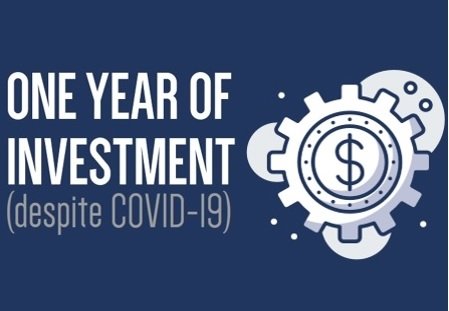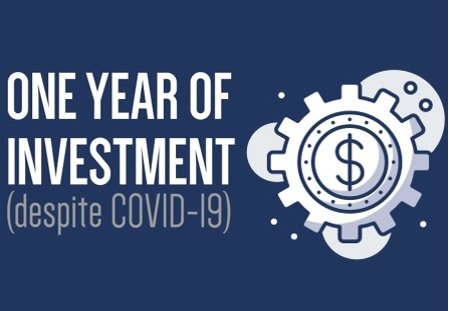One year of investment

There is no doubt that 2020 was an atypical year. A year marked mainly by caution and restraint, in which uncertainty has been the usual travelling companion. Probably these are not the best conditions for investments, which tend to avoid lack of certainty and unpredictability. Still, despite this, as a summary of the year, at Iberian Lawyer, we wanted to outline various types of spaces, products and investment sectors and also approach the players who carry them out.

VENTURE CAPITAL
When the pandemic was only marginal news, in the February issue, we spoke to Clara Gutiérrez, managing partner of Gennaker Fund, a Venture Capital fund that invests in innovative startups in nine growing industrial sectors and which in turn presents developments in Machine Learning. Clara highlighted that the number of investors who are targeting the Iberian market in search of startups continues to grow, and she assured that 2020 would be the year of Machine Learning. She also pointed out the need for a more attractive fiscal framework in Spain in order to have conditions similar to those of some of our European peers and not be at a disadvantage when it comes to attracting activity to the sector.
“OUR STRATEGY IS BASED ON INVESTING IN MACHINE LEARNING AS THE TECHNOLOGY THAT SUPPORTS MANY SECTORS TO IMPROVE THEIR PRODUCTIVITY EXPONENTIALLY AND CREATE NEW VALUE CHAINS AND OPPORTUNITIES AT THE SAME TIME”
CAPITAL INVESTMENT
Concerning the situation of capital investment in Portugal, Kennedys partner in Lisbon Nuno Maldonado Sousa explained to us in the March issue that it is essential to distinguish two realities that have very different characteristics. On the one hand, institutions set up to finance companies by taking capital positions, which also act as a guarantee for the investment, and on the other hand, independent investors, who tend to work in more or less organised groups, which channel the capital of wealthy “savers”.
“THE IMPRESSION WE GET IS THAT HIRING MODELS HAVE BEEN INSTITUTIONALISED, WHICH DOES NOT FAVOUR THE DYNAMISM AND VERSATILITY THAT NEW PROJECTS REQUIRE. TO HAVE WINNING PROJECTS, IT IS NECESSARY TO ADOPT ADEQUATE, TAILOR-MADE SOLUTIONS AND THIS REQUIRES BOLD DECISION-MAKERS”
INVESTMENT PORTFOLIO
José A. Nogueira, Remelgado, Silva Nogueira & Associados (RSN Advogados) managing partner, told us in the April issue that the culture of the Private Equity industry in Portugal must be developed as soon as possible. Although as a way of financing and capitalisation has evolved so much, the road ahead is still enormous. For Nogueira, one of the endemic problems of the Portuguese capital investment market is its mentality, still very much connected to the past and, even when companies are willing to invest, they want to do it their way, without the necessary flexibility in this type of operation. Companies, sometimes with great potential, also at an international level, are the ones that are harmed the most in the process. But, above all, he stressed that change must come from the way investments are made, because when a bank decides to invest in any company or private client, it always has to bear in mind risk versus return. If there was currently more aid to private investors in Portugal than to companies, it was because it was more profitable to buy than to invest.
“THE RESPONSIBILITY LIES WITH THE INVESTOR. IT’S NOT JUST PROVIDING CAPITAL THAT IS MISSING. MOST OF THE TIME IT IS MANAGEMENT AND SKILLS THAT ALLOW THE IDEA TO BECOME A PRODUCT, ALLOWING IT TO BECOME THE BASIS OFA NEW BUSINESS MODEL”
IMPACT INVESTMENTS
In May, at the height of the pandemic, the proposal of impact investments gained strength. To discuss them we spoke in our May issue with Cuatrecasas Tax partner Maribel Villaró. She highlighted that impact investments are investments in companies, organisations or funds made to generate a measurable positive social and/or environmental impact, in addition to obtaining a financial return. She also spoke about the four fundamental characteristics that define the impact investor as opposed to the traditional investor.
“INVESTING IN SOCIAL INNOVATIONS THAT PROVIDE SOLUTIONS TO THE BASIC PROBLEMS OF HUMANITY WHERE THE PUBLIC SYSTEM DOES NOT REACH IS PRECISELY THE REASON FOR EXISTING OF IMPACT INVESTING, AN ASPECT THAT MAKES SPECIAL SENSE IN A GLOBAL CRISIS SITUATION SUCH AS THE ONE WE ARE EXPERIENCING”
INVESTMENTS AND PANDEMIC
Mafalda Almeida Carvalho, CCSL Advogados partner, was the chosen one to clarify how 2020 was affecting investment in Portugal. In May, she explained to us that although the next few months would still be a challenge and investors would have to rethink their approach, Portugal is now better prepared to fight it than in the financial crisis of 2008, although caution will still be the dominant note.
“WE ARE FINDING THAT BOTH NATIONAL AND EUROPEAN FINANCIAL INSTITUTIONS, AND EVEN THE AMERICAN ONES, THAT SUFFERED THE MOST IN THE CRISIS TEN YEARS AGO, ARE NOW MUCH STRONGER AND THEREFORE BETTER PREPARED”
FAMILY INVESTMENTS
Claudio Doria, Doria Tölle & Asociados founder, spoke to us in June about family investments. At that time it seemed that the first wave of the pandemic had already been closed, and he pointed out precisely how disruptive the first wave had been for investment portfolios aimed at groups of clients with a family relationship. At that time, it seemed that the fundamental consequences of the lockdown had been the postponement, interruption or withdrawal of many of the investments planned and executed in those months. Furthermore, he told us about the sectors which, far from being affected by the COVID setback, had ended up using this context to accelerate some changes and processes already planned, such as the pharmaceutical and health sector, logistics, digital business and online sales.
“THERE’S A LOT OF ANALYSIS GOING ON, AND APPARENTLY MONEY LOOKING FOR A DESTINATION. WHEN THE STATE OF ALARM IS LIFTED AND WHAT IS CALLED THE ‘NEW NORMAL’ RETURNS, WE WILL SEE IF THESE OPERATIONS ARE ALSO REACTIVATED SOON AND WHAT THE REAL IMPACT OF THIS CRISIS HAS BEEN”
ADVISORS IN THE COVID-19 ERA
In June, the “new normal” was the trending topic. We were all discussing how this “new normal” might affect our routines. That was the moment when the de-escalation seemed to be finishing. And we interviewed Costa Pinto Advogados founder, José Costa Pinto, to discuss the state of the Private Equity issue in Portugal in the aftermath. With him, we reviewed the country’s regulatory implications, which, in his view, needed to be simplified to encourage investment. He reminded us that some issues perhaps still had not been assumed yet. Under his point of view, the pandemic was not causing the recession. It was a trigger which accentuated processes the companies were already undergoing. That might explain why those who were already struggling before the pandemic sank in the middle of it. And, at the same time, the ones who were already managing their issues by the time pandemic began were ready to take advantage of the crisis circumstances.
“TRUST IS JUST AS OR MORE IMPORTANT THAN LIQUIDITY FOR BUSINESS TO HAPPEN, IT IS UP TO US TO LOOK WITH CONFIDENCE AT THE MARKET AND UNDERSTAND THAT EVEN IN TIMES OF CRISIS OPPORTUNITIES ARISE AND MUST BE SEIZED”
REAL ESTATE
In the July-August special, Iberian Lawyer sought to find out how the COVID-19 had affected investment in the Real Estate sector. To do this, we approached experts such as Fernando Soto, Freshfields Bruckhaus Deringer Real Estate partner in Spain, and Silvia Paternain, Tax partner at the same firm. Both stressed that it was probably the right time to start looking for opportunities to get assets at reasonable prices. An opinion quite close to the one defended by Guillaume Cassou, KKR Real Estate partner, who in the same interview postulated the excellence of the Real Estate sector as a good investment scenario, since unlike other areas, price volatility is much lower.
“TRENDS SUCH AS PROPTECH (USE OF TECHNOLOGY TO HELP INDIVIDUALS AND BUSINESSES IN SEARCHING, BUYING, SELLING AND MANAGING REAL ESTATE) WILL CONTINUE TO PROGRESS, PROBABLY FASTER THAN EXPECTED AS A RESULT OF THESE DEVELOPMENTS, AND HELP BRING MORE INNOVATION TO THE RE SECTOR”
OPPORTUNITIES IN PORTUGAL
Tariq El-Asad, founder of Tamea International, told us in the July-August issue that he was witnessing the change in Portugal’s Real Estate sector over the last six years. His experience in the country has led him to appreciate its possibilities; it is considered one of the safest countries in the world, the climate is excellent and its natural beauty exceptional. Combine that with good food and wine, a relatively low cost of living, and typically open and generous people, and it’s easy to see why foreigners enjoy the country. Many of the opportunities that are attracting international investors to Portugal are in less mature sectors because that is naturally where the high risk/high reward scenarios are to be found.
“THE GOVERNMENT HAS INTRODUCED SEVERAL PROGRAMMES TO ENCOURAGE INVESTMENT, AND THESE EFFORTS GIVE INVESTORS CONFIDENCE THAT THE DECISION-MAKERS ARE TRYING TO TAKE THE COUNTRY IN THE RIGHT DIRECTION”
STARTUPS
The startup sector is one of the few that has not noticed a drastic drop in investment in a year like this, and to find out a little more about the investments in these innovative companies in September we asked experts from DWF-RCD, specifically two of its partners in the Innovation and Entrepreneurship area: Judith Saladrigas and Carles Ros, and also Montserrat Vendrell, partner at Alta Life Sciences, the exclusive investment advisor to Alta Life Sciences Spain I FCR (ALSS I FCR), a Venture Capital fund managed by Altamar Private Equity SGIIC. All three stressed the most striking aspects that startup projects should exhibit and the need to remain alert to both business and legal matters, that may go unnoticed at first.
“ENTREPRENEURS ARE SPECIALISTS IN THEIR BUSINESSES, BUT THEY DO NOT NECESSARILY NEED TO HAVE IN-DEPTH KNOWLEDGE OF THE LEGAL ASPECTS INVOLVED IN SETTING UP A BUSINESS PROJECT, NOR OF THE IMPLICATIONS OF BRINGING IN AN EXTERNAL INVESTOR, WHICH IS WHY IT IS ADVISABLE TO BE COUNSELLED BY EXPERTS FROM THE OUTSET”
RENEWABLE ENERGY
One of the most strong commitments that the Portuguese administrations have recently made has to do with the development of renewable energies, to the extent that the country is one of the European leaders in the production and, above all, consumption of this type of energy. To analyse the situation, we turned to Manuel Andrade Neves, Abreu Advogados Energy partner, with whom we had the opportunity to exchange relevant information in September. The energy transition is presented as an advanced reality in Portugal, and it is shown that there are already several days a year when they can self-supply the internal consumption only employing these energy sources. The already established exploitation of solar, wind and hydroelectric energy is favouring the research into new models that might represent a hopeful challenge in this respect: new models as the generation of electricity from the tides, the offshore wind farms or hydrogen as fuel.
“THE PUBLIC OPINION, MORE AND MORE FOCUSED ON CLIMATE ACTION, COMPELLED THE GOVERNMENT AND THE INVESTORS TO PROMOTE GREEN OR ENERGY TRANSITION PROJECTS. EVEN THE MOST TRADITIONAL ENERGY INDUSTRIES IN PORTUGAL ARE NOW TURNING ATTENTION TO THIS TENDENCY BY MEANS OF ADAPTING THE EXISTING POWER PLANTS TO THESE PROCESSES”
FOREIGN INVESTMENT
Economic recovery is about attracting investors and helping foreign investors who do not know the legal framework they are facing. Assisting them is the starting point of an association such as PAIIR (Portuguese Association of Immigration, Investment and Relocation), which focuses on assistance during the process of investment immigration in Portugal, with whose founders, SaraSousa Rebolo and Vanessa Rodrigues Lima, we spoke in October. The Portuguese golden visa program, ARI, has been in recent years an incentive that has served to increase investments, especially in the real estate sector, by foreigners. Despite the recent decision of the Portuguese Government to decentralise foreign real estate investments from the two big cities where they have been concentrated by eliminating tax incentives if the chosen property is in Lisbon or Oporto, and, of course, the turbulences of this year we are finishing, so affected by mobility controls, the attractiveness of this type of investment does not seem to diminish.
“THIS MARKET (OF FOREIGN INVESTMENTS) HAS A HUGE POTENTIAL, IT IS RARE TO FIND A LAW FIRM THAT HAS NOT YET ADVISED A CASE, OR, A BANK, AN INSURANCE COMPANY, A TAX ADVISOR OR A BROKER, AMONG SO MANY OTHERS, THAT WAS NOT ALSO PART OF AN INVESTMENT TRANSACTION”
RISK INVESTMENTS
To discuss the peculiarities of hedge funds, in October, we spoke with Sixto de la Calle, Eversheds Sutherland Corporate and M&A of counsel and head of the Private Equity practice in Spain. De la Calle explained to us that these types of funds are alternative investments that employ a variety of strategies to obtain benefits for their investors in the short term. They are opportunistic by nature, as are, to some extent, Private Equity firms with a distressed economy angle, although the approach is different. The objective of a hedge fund is to provide the highest possible return on investment in the fastest possible way. To achieve that, hedge fund investments target primarily highly liquid assets, allowing the fund to make a quick profit on one investment and then use those funds for another, more promising investment immediately.
“HOWEVER, IT IS TRUE THAT NOT ONLY OPPORTUNITY AND PRICE PLAY A ROLE IN THE EQUATION. THERE ARE OTHER IMPORTANT CONSIDERATIONS THAT MAY LEAN THE SCALE IN FAVOUR OF DEBT FUNDS DESPITE PRICE. SOMETIMES DEBT FUNDS HAVE THE ABILITY TO PROVIDE CERTAIN DEGREES OF FLEXIBILITY THAT A BANK IS UNABLE TO PROVIDE TODAY”
WEALTH MANAGEMENT
In order to get to know a world that is less hermetic and unreachable than is usually believed, in November we approached the Dunas Capital financial group, and spoked with Gustavo Caiuby Guimarães, the company ́s asset management director. He explained to us that, in reality, an asset manager does not work very differently from an investment manager, as his essence is very similar. However, the investment manager focuses more on the technical aspect, and the wealth manager has a broader vision, not only paying attention to the client’s investments but also looking at other variables such as succession and tax planning.
“WORD OF MOUTH FROM OUR CLIENTS ALSO HELPS US TO CONTINUE INCREASING IN DIFFERENT GEOGRAPHIES, AND IT IS THE BEST THERMOMETER TO EVALUATE OUR PERFORMANCE AND SERVICES PROVIDED. LASTLY, THE IDEAL CLIENT PROFILE IS THE ONE WHO UNDERSTANDS AND TRUSTS OUR WORK TO MANAGE HIS/HER PORTFOLIO OF ASSET”
SWAPS: COMPLEX INVESTMENTS
To know more about swaps, in November we went to Ignacio Delgado, a lawyer at Legisfund. In essence, a swap, as Delgado explained to us, is a contract by which two parties agree to exchange a series of amounts of money at future dates. Usually, these exchanges are referenced to interest rates. These rates fluctuate considerably, and this is what makes this type of investment a complex and difficult mechanism to master. A swap is considered a complex-speculative investment contract. And it is an investment with tremendous risk, typical of financial engineering. Case law has established the duty of the financial institution to inform about this type of investment product and to do so in a sufficient and understandable way about the possible consequences of upward or downward fluctuations in interest rates and the high costs of early cancellation.
“IN OUR EXPERIENCE, CLIENTS WERE HARDLY EVER MADE AWARE OF THE RISKS INVOLVED IN SWAPS, TO BEGIN WITH, BECAUSE THE EMPLOYEES WHO MARKETED THEM MOSTLY LACKED THE NECESSARY KNOWLEDGE TO DO SO, SO IT WAS DIFFICULT FOR THEM TO EXPLAIN SOMETHING THEY DID NOT KNOW”
To read the article in full please download issue N.100 here.












